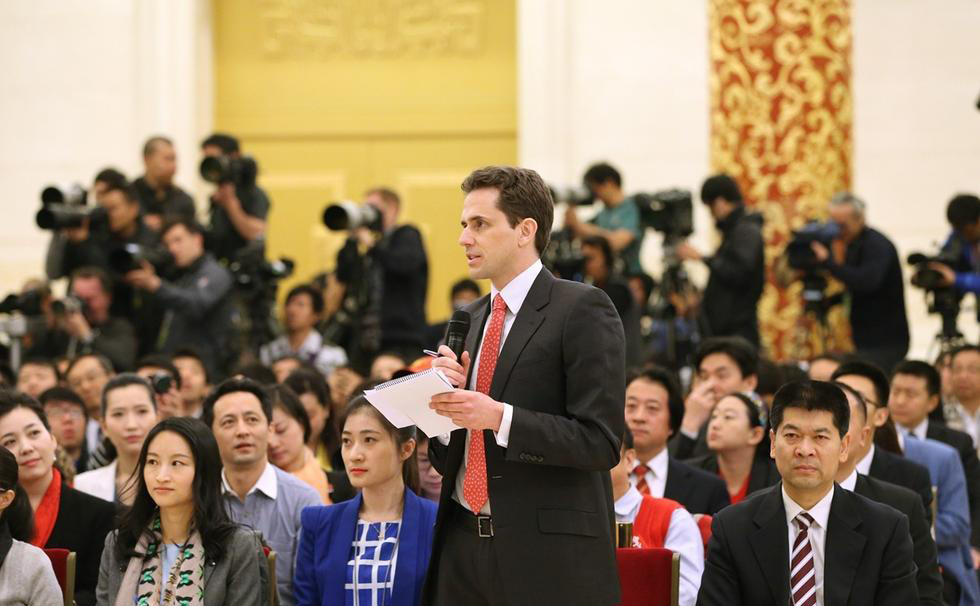Two Sessions report stresses rule of law, balanced growth

On March 15, a foreign reporter asks questions to Premier Li Keqiang during the press conference after the closing meeting of the Third Session of China's 12th National People's Congress. (PHOTO: XINHUA)
The Third Session of the 12th National People's Congress (NPC) opened in Beijing on March 5.
Premier Li Keqiang delivered the Report on the Work of the Government on behalf of the State Council during the session. The report includes the input of Chinese Internet users for the first time. The interviewed NPC deputies and members of the National Committee of the Chinese People’s Political Consultative Conference (CPPCC) identified five highlights in the report.
Steady growth, restructuring
China's economic development has entered a phase that leaders refer to as the “new normal.” The country is in the crucial period during which challenges need to be overcome and problems need to be solved.
“After more than 30 years of rapid growth, it is normal and necessary to slow down its economy,” said Cheng Enfu, a NPC deputy and a member of the Academic Divisions of the Chinese Academy of Social Sciences (CASS). Cheng pointed out that in light of rising labor costs coupled with greater resource and environmental constraints, it is unsustainable to rely on the old development model characterized by high investment, consumption and quantitative expansion.
A moderate decrease in the growth rate is conducive to economic restructuring and upgrading. However, he also said that steady growth is the basis for optimizing the economic structure. “Without steady development, employment and income is unlikely to continue to increase,” he said.
Rule of law
Premier Li emphasized that government procedures for examination and approval should be simplified, meanwhile, people in power should respect the law. Government departments must perform duties according to the law, and must not do anything unless it is mandated by the law. For the first time, the report mentioned that officials who shirk their duties must be exposed and held responsible. Administrative omission is a new form of corruption and the emphasis on such a phenomenon reflects that the government is aware of the problems in the exercise of power, said Hou Xin, a CPPCC member and deputy dean of the School of Law at Nankai University.
Implementing overall reform
Twenty reform measures are listed in the report, including reforms to the household registration system, service industry, and policies on finance and taxation. These steps embody the initiative of the government to serve public interest with practical action.
The 18th CPC National Congress, the Third and Fourth Plenary Sessions of the 18th CPC Central Committee and General Secretary Xi Jinping’s speeches have laid the groundwork for the great rejuvenation of the Chinese nation, said Zhang Xiaoshan, a NPC deputy and a member of the Academic Divisions of CASS. “With a roadmap and a timetable, the present task is how to put these ideas into practice.”
Improving education, employment
In terms of education, the report writes that we should make sure that students from rural and poor areas have easier access to higher learning and everyone has the chance to live a better life through education.
“The government has been concerned about education and calls for the investment of more educational resources in western and central China in particular,” said Jin Zhengyu, a NPC deputy and vice-president of Jiangnan University in Jiangsu Province.
The report explains the focus of the graduate employment initiative, which aims to ease employment pressure and improve livelihood and social construction, said Lou Yuangong, a CPPCC member and president of Henan University. “As a university president and a worker in higher education, I’m encouraged and inspired by these plans. I know that it is an arduous task and we should shoulder the responsibility.”
Legislating environmental taxes
The report writes that the government must demonstrate its determination to curb environmental pollution by strengthening environmental law enforcement, cracking down on unauthorized pollution and severely punishing those who skirt the law.
Lü Zhongmei, a NPC deputy and president of Hubei University of Economics has paid attention to environmental protection over the years. She said she was happy that the report this year suggests an environmental tax.
“Combating environmental pollution cannot be done in one fell swoop, and it is important to keep protecting the environment,” Lü said.
The session came to a close on March 15. At the closing meeting, China adopted a revision to the Legislation Law, paving the way for legal reform.
